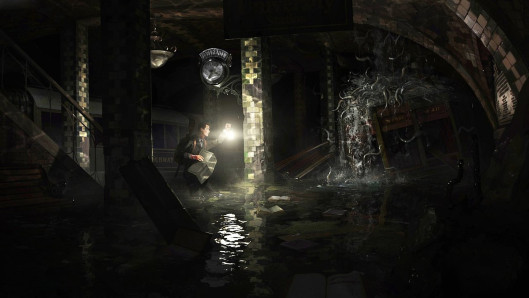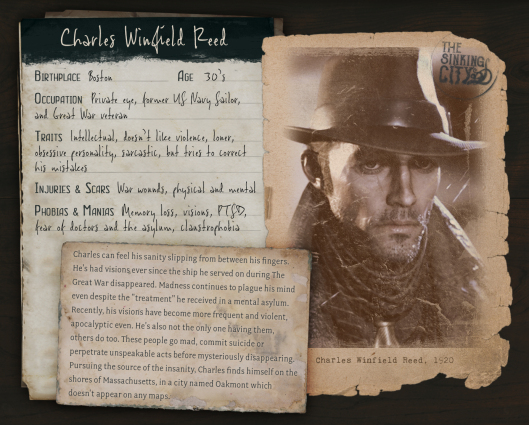You’re probably utterly fed up of hearing about The Sinking City, after what seems to have been years of interminable marketing overkill for a product that kept getting delayed. I’ve basically ignored it up until now. But finally, this new game has actually been released today on consoles, in stores (a DVD with what appears to be a Steam-lock), and a digital download for Windows PCs (the latter via the Epic Games Store only, so don’t go looking for it on Amazon or Steam).
There are now some genuine reviews available, from those who’ve completed it.
Why might the game be important? Partly because it follows the recent Lovecraft-faithful Call of Cthulhu (Cyanide Studios, 2018) and the general critical success of that game among fair-minded reviewers. Despite its imperfections, the initial sales success did wonders for Chaosium’s cash-flow, the company on whose famous RGP game it was closely based. Having two solid Lovecraftian games in a row, games that get a lot of things right in terms of aligning Lovecraft’s original vision with gaming fun, would be good. If might also lead to further glimmerings of understanding, among the masses, about who H.P. Lovecraft was.
But mainly The Sinking City promised to be important because the Ukrainian makers have a good track record, making detective-mystery-horror adventure games with Sherlock Holmes (apart from one, 2016’s Devil’s Daughter — which had a very weak storyline and crippling launch-day bugs). The Sinking City is the maker’s first Lovecraft game. From the E3 previews and trailers one can see that it’s big, polished, and from a team that really knows what they’re doing. Will it, therefore, be as enjoyable and accessible as nearly all of their Sherlockian outings?
The setting is a 1920s coastal town of Oakmont (croak-monsters, geddit…) in New England, realised as a big ‘open world’ town… and if you’re a regular reader of this blog then I guess you kind of know the rest. It’s a good start that the makers have chosen such a historical setting. There’s also a Dark Corners-like ‘sanity meter’ in the game, another promising sign.
One difference from Lovecraft’s stories, though, is that your hero is physically Sherlockian and vulpine. He’s a cynical noir-detective type in post-war shell-shock, rather than a wilting antiquarian poet. As such you apparently get a Thomas F. Malone-like insight into ‘the world of hidden things’, you sport a nice Indiana Jones style hat, and (despite the “doesn’t like violence” on the character sheet) get to use guns and grenades.
Anyway, that’s the basics. It was released 48 hours early, to those who pre-ordered it, to try to forestall the usual haters. Here’s what some of the initial reviews say today…
A “decent detective game … As you explore a crime scene you collect clues that, while useless on their own, can be connected in the Mind Palace to open up new lines of investigation. And you have to make these connections yourself, without any hand-holding or hints, which makes a successful deduction especially satisfying. [yet] the solutions to many of the cases lacked a satisfying “Aha!’ moment. … combat is basic and uninspiring … [overall] it doesn’t quite stack up with the best of Frogwares’ Sherlock series” — PC Gamer, UK edition.
“Repetitive detective work … The most captivating cases are the more supernatural ones, where what one discovers is so unpleasant that it becomes worthwhile and one seeks out more such investigations. I wish the game had dared to slip away more often from the hard-boiled detective stance and let its atmosphere drift toward the approaching insanity that has Oakmont in its slimy grip.” — PC Gamer, Swedish edition (translation).
What’s not even mentioned in PC Gamer and other reviews is that there are adjustable levels of difficulty…
“… the perk of the easier game modes is they will give you hints as to what you should do next. While playing on master sleuth difficulty, you really are left to your own devices to figure things out.” — GameSpace.com
… while the Daily Dot also points out that 6-hour rush-reviewers may not have played it correctly…
“Where The Sinking City shines is in the elimination of any simple solutions. No matter how big or small the investigation, you must do it yourself. … The Sinking City demands astute observation—in everything from vague suspect descriptions to the intersection of street corners. Players must commit the very geography of Oakmont’s intricacies to memory.” — The Daily Dot.
“One of the real highlights of The Sinking City is how much freedom of movement there is and how much there is to explore. … the graphics in The Sinking City are gorgeous … When I was walking around many of the city squares, I was often reminded of Red Dead Redemption 2 both in the detail of creating the feel of a city in the grips of disaster and also just how beautiful everything looks. Top notch job on selling the setting and making it believable. It’s exciting and enthralling from the first moments right up to the very end. My biggest complaint is the archives [city and newspaper archives] are more frustrating to use than they should be, but that’s not a huge deal overall.” — GameSpace.com
“The city of Oakmont has quite a lot of character … boating through the town is genuinely enjoyable, even if you can get stuck on a reef and have no ability to just, like, nudge your boat back into the water. … The shooting feels terrible, encouraging you to mostly avoid it. Sometimes it’s better to run… Detective Charles Reed is a healthy mix of witty and dreary. And while Oakmont itself is samey within its own city limits, it’s a memorable setting nonetheless. … manually placing markers on the map (lots of markers) in order to track down quest and side-quest locations is great. I love it. Far more than if waypoints just automatically populated the map, like in pretty much any other open-world video game.” — gamingnexus.com
“Sinking City does a fantastic job of keeping you on edge. The visions are genuinely unnerving, even if you’ve seen most of them with an hour or so of playing. The ambient noise of the city always sounds a little like something sneaking up behind you … an incredible atmosphere that really grips the darkest parts of your mind. Oakmont feels hostile, unwelcoming and full of secrets … While it stumbles with its characters and combat, The Sinking City is a great first step [for those new to such gaming] into the supernatural detective game.” — The Daily Star, UK tabloid newspaper.
“While the combat fails to prove engaging [and needs the inevitable post-launch patch]… The Sinking City delivers when it needs to. There’s a section early on where Reed dives underwater that truly contains one of the most bone-chilling, terrifying sequences I’ve ever seen.” — The Daily Dot.
“The Sinking City is well worth playing for the initial rhythm of its casework and the freshness of its setting, but its mechanics, like its mystery, end up flooded [by elements that ‘pad-out’ the gameplay].” — videogamer.com
“Despite some technical shortcomings and constraints, The Sinking City does have a lot going for it. Fans of Lovecraft’s work will find plenty of references to dig into here. … I was impressed at how the Lovecraftian lore was intertwined into this spiralling tale. … More than other video games I can remember playing, I really felt I was investigating and solving a case here. I ended up being much more invested in building conclusions than I had anticipated.” — PlaystationLifestyle.
“More than any game I’ve played before, The Sinking City understands what it means to be Lovecraftian. Oakmont is contaminated with hatred and sickly, chilling environmental detail. Citizens spew vitriol at the player and at one another. The streets are often raked with rain and a harsh wind. Frogwares’ detailed ambiance goes a long way in making this game stand out among a crowded field.” — The Daily Dot.
Investigations can be… “repetitive, to say the least, but I enjoyed these investigations far longer than I thought I would. [Despite some lacklustre “bring me three X’s and I’ll tell you what I know” side-quests] I was still compelled to see the main story through to its conclusion. There are enough intrigues and unique characters I wanted to talk to, to just abandon it, despite it eventually culminating in an ending that falls flat despite its grand build-up. Yet while I enjoyed and frequently appreciated the side characters and the often fantastic voice acting given to them, I think The Sinking City’s other large problem is [the wooden detective] Charles Reed himself.” — MS Power User.
“It’s janky, a little unpolished and ugly but I couldn’t stop playing it.” — PowerUp!
“PC players need not worry too much about major problems such as crashes. I haven’t experienced any. Stuttering and slowdowns were also non-existent.” —PC Invasion technical review.
“[After finishing it] I realized that it’s a game which I would consider a treat for fans of H. P. Lovecraft’s works, the Cthulhu Mythos, and various stories of cosmic horrors and nightmares from the depths. Its presentation and atmospheric tones, at times disturbing and oftentimes portraying abject misery, perfectly depict the worlds crafted by masters of ungodly visions and terrors. The Sanity Effects and investigation processes are also decent and surprising at points. They’re even psychologically jarring on a couple of occasions. But as a survival horror or open-world adventure game, however, The Sinking City only wades in knee-deep waters instead of diving in to create something truly special.” — PC Invasion full review.
So it sounds like its the usual story for a first-day game release. Wait for a year, until the first three bug-fixing and AI-fixing patches are out, and there are two or three expansion packs to fill up the empty spaces the makers have deliberately left in their large open-world. If you’re a three-games-a-week player then you’ll probably hate it because you’ve ‘seen it all before’ and combat is poor and the weapons puny, but three-games-a-year players new to detective-mystery games will probably get a lot out of it. Seems to work best on a Windows gaming PC, at present.



Pingback: Deluxe Madness, Sinking rises… | Tentaclii